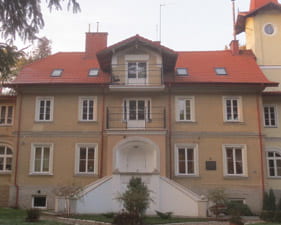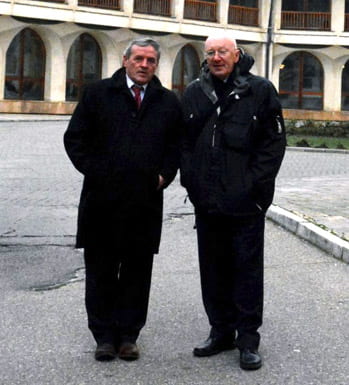In late November and early December, PMC Director Marek Zebrowski was in Poland and Germany, stopping in Warsaw, Pułtusk, Julin, Gorzów Wielkopolski, Kraków, Kąśna Dolna, Berlin and Gdańsk, to meet with a number of government officials and leaders of various civic organizations, as well as colleagues in music publishing, libraries, music schools and universities. Director Zebrowski’s visit was related to the PMC’s operations in Los Angeles as well as to the Paderewski Festival in Paso Robles and its Cultural Exchange Program, for which Zebrowski serves as Artistic Director.

The long round of appointments began with a meeting in Warsaw with Adam Bala, director of the Discovering Paderewski Festival in Lviv, Ukraine, and member of the board of Wspólnota Polska—an organization devoted to preserving links with the Polish diaspora around the world. Also present at the meeting was Katarzyna Renes, who provided expert insight into various grants and funding mechanisms that could assist with PMC’s annual operations budget. Later that day, another executive at Wspólnota Polska, Marek Różycki, joined in the meetings to discuss the potential sources of funding the publishing the Po
lish language version of Zebrowski’s Paderewski in California as well as the 2016 edition of the Exchange Program, when young pianists from the Tarnów region in Poland and Khmilnyk in the Ukraine will visit California.
Later, Mr. Bala had graciously taken Dir. Zebrowski to tour the Dom Polonii in the town of Pułtusk, located about 50 miles north of Warsaw. Dom Polonii occupies a carefully renovated mediaeval-era castle, picturesquely located on the banks of the River Narew. Standing at the end of a very long and narrow old town square, the castle offers luxurious and elegantly-appointed rooms and apartments with excellent local cuisine on display at several of the castle’s stylish dining halls (see photos here). Welcomed by its director, Mr. Jerzy Rosa (pictured at left), after an extensive tour of the building and grounds, the guests were treated to a veritable culinary feast of Polish delicacies. One of the salons upstairs is dedicated to Paderewski, who had visited the castle right after World War I. His bust graces a space that is an intimate concert venue, capable of seating about 100 guests. Cooperation with Wspólnota Polska, the hosts of this amazing place, may lead to a 2017 Exchange Program visit and concert on the premises.
 Continuing on the Paderewski theme, Mr. Bala then drove Dir. Zebrowski to Julin, a property about 30 miles northeast of Warsaw that Ignacy Jan Paderewski acquired in 1919. That’s where Madame Helena Paderewska (pictured at right) founded a home for girls in and to this day, this elegant fin-de-siècle villa with extensive gardens serves as a home for orphaned youth. Krzysztof Fedorczyk, the Supervisor of the Węgrów District, welcomed Mr. Bala and Mr. Zebrowski with another delicious meal prepared especially for the visitors by the home’s staff. A tour of the property included a delightful visit with the kids who lived there and were happily working on painting and decorating heaps of Christmas ornaments. With time, Julin’s facilities may be turned into a local cultural center and possibly be linked to future Exchange Program calendar of visits and performances.
Continuing on the Paderewski theme, Mr. Bala then drove Dir. Zebrowski to Julin, a property about 30 miles northeast of Warsaw that Ignacy Jan Paderewski acquired in 1919. That’s where Madame Helena Paderewska (pictured at right) founded a home for girls in and to this day, this elegant fin-de-siècle villa with extensive gardens serves as a home for orphaned youth. Krzysztof Fedorczyk, the Supervisor of the Węgrów District, welcomed Mr. Bala and Mr. Zebrowski with another delicious meal prepared especially for the visitors by the home’s staff. A tour of the property included a delightful visit with the kids who lived there and were happily working on painting and decorating heaps of Christmas ornaments. With time, Julin’s facilities may be turned into a local cultural center and possibly be linked to future Exchange Program calendar of visits and performances.


Leaving the Paderewski-themed visits aside for a few days, the next place to visit was Gorzów Wielkopolski, a mid-sized town located between Poznań and Szczecin in northwestern Poland. For a few years now Gorzów’s Philharmonic Hall has been a shining example of modern architecture that combines excellent design with superb acoustics and ample facilities for the resident orchestra and visiting musicians.
About two years ago, Monika Wolińska, the Gorzów Philharmonic’s Artistic Director, suggested cooperation with the Polish Music Center on re-orchestrating film scores by Bronisław Kaper that form the core of PMC’s Kaper Collection. Selections from Kaper’s features, including Green Mansions, The Stranger, The Glass Slipper, Tobruk, The Way Westand Lili (for which Kaper received the Academy Award), were sent to Krzesimir Dębski for re-orchestration based on Kaper’s original indications notated in the so-called short scores, which are held in the Center’s Collection. This project eventually added film music by Jan A. P. Kaczmarek—the other Polish Oscar winning composer—and the November 29 concert in Gorzów presented the music by both composers as well as promoted the superb recording of film cues by Kaper and Kaczmarek, performed by Monika Wolińska and her young and excellent orchestra. Krzesimir Dębski and Marek Zebrowski provided commentary during the entire concert, giving insights on the film music in general and this project in particular. Kaper’s works, which filled the second half of the concert, elicited an enthusiastic standing ovation at the end and Maestra Wolińska was more than happy to oblige with an encore presentation of her favorite cue from The Way West. Immediately after the concert, the spacious lobby of the Philharmonic was filled the audience who rushed en masse to purchase the beautifully-produced CD featuring music by Kaczmarek and Kaper, released on Warner Music Poland.

With the successful conclusion of the Gorzów Philharmonic project, it was time to take a long trek across Poland—from Gorzów in the northwest to Kąśna Dolna in the southeast–to meet with an enthusiastic Exchange Program supporter, Mr. Dawid Niedbała. Dir. Zebrowski’s few days in Kąśna Dolna were ably organized by Mr. Niedbała jointly with the new director of the Paderewski manor house, Łukasz Gaj, and director of the Domosławice Music School, Kazimierz Wojnicki. During two long days of piano workshops, about two dozen students had a chance to present their repertoire and work on refining its delivery for a student recital that closed Dir. Zebrowski’s productive and intensive visit in Paderewski’s former home. With a firm declaration of cooperation from the director and faculty of the Domosławice Music School and a happy consent from the new director of the Kąśna Dolna manor house, future workshops and the Exchange Program that was established in 2009 are scheduled to continue with the financial support of supervisors in three southeastern provinces of Poland—Tarnów, Brzesko, and Nowy Sącz.


As soon as the piano workshops were over, Dir. Wojnicki arranged for meetings at the European Penderecki Music Centre in Lusławice and Dębno Castle—both locations within an easy drive from the manor at Kąśna Dolna. Alfred Wolanin (pictured above, right), the administrative manager, gave a thorough and fascinating tour of the Penderecki Center with its incredible facilities that include two excellent Steinway concert grands, great performing spaces (the Main Auditorium with its superb acoustics and the smaller chamber-sized concert venue), as well as practice rooms and lodging space for visiting artists. This is another prestigious location for future Exchange Program concerts organized jointly by the Paderewski Festival in Paso Robles and its partners in Poland.

The next stop on the journey from Kąśna to Kraków was Dębno Castle. Dating from 1480, this picturesque Gothic structure is a pristine example of a mediaeval knight’s residence. Its beautifully authentic interiors now serve as a branch of Tarnów Regional Museum and feature numerous examples of interior furnishings, armor, and other household items spanning the long history of this stunning place. The great surprise of a lovely tour—given by the enthusiastic and erudite curator of the place—was that the Knights’ Hall on the Castle’s piano nobile has an excellent 1880s Knabe concert grand in ideal condition (pictured above), so Exchange Program concerts there are certainly on the “must-do” list for the summer of 2017!
Kraków—Poland’s first capital—is only a half-an-hour drive west from Dębno and the Kraków Music Academy was the next stop on Dir. Zebrowski’s itinerary. Cooperating with Marek Szlezer and Jan Kalinowski—members of the Cracow Duo and faculty members at the Music Academy —Zebrowski gave two days of master classes for a large group of piano students from all over Europe currently studying at the Academy. A sizeable group of other students as well as few professors from Kraków and Katowice Music Academies were in the audience for this event.
The next two meetings were in Berlin with Frank Harders-Wuthenow, Promotion Executive at Boosey & Hawkes/Bote & Bock Publishers in Berlin. His energetic promotion of music by Polish composers in print, concert support, recordings, and organizing events accompanying presentation of Polish music all across Europe perfectly dovetails to our Polish Music Center mission. Possibilities of promoting Józef Koffler (and the PMC publication about him) in conjunction with concerts of Koffler’s music in the spring of 2016, as well as joint projects on Henryk Wars [Henry Vars], Roman Ryterband, and other, lesser-known names in Polish music were discussed. After receiving a large sample of materials from the Polish Music Center—concert programs, recordings and other information—Mr. Harders enthusiastically opined that, “I hope we can collaborate on many projects and try to create a strong LA-Berlin axis to promote Polish music in the future!”

Gdańsk was next on Dir. Zebrowski’s itinerary. The most important meeting was with Dr. Monika Płuciennik (pictured above) at the Gdańsk branch of the National Archives. During her PMC residency in June of 2014, Dr. Płuciennik initiated the long overdue process of cataloging the PMC’s Kaper and Wars Collections. Next in the professional exchange sponsored by the National Archives, PMC Assistant Director Krysta Close spent four weeks of last summer in Gdańsk, learning the latest techniques for archiving manuscripts and collections. Dir. Zebrowski also met with the Gdańsk Music Academy Head Librarian, Anna Michalska, to discuss ways of processing and cataloguing materials that are continuously donated to the Polish Music Center. Lastly, there were meetings with Liliana Górska, faculty at the Gdańsk Music Academy, and the NEO Quartet, following on the concerts jointly given by the Quartet and Mr. Zebrowski at the 15th Festival International de Musique en Catalogne in Céret, France, last August.
Back in Warsaw, Mr. Zebrowski met with the PMC’s partners at the National Archives—Director Andrzej Biernat, Katarzyna Kiliszek (representing the Department for International Cooperation) and Anna Krochmal, Head of the Department for International Cooperation. Also present at the meeting was Robert Górski, the intrepid archivist from Warsaw who spent six weeks last fall at PMC cataloguing photographs from our Paderewski/Paso Robles Collection. Following wide-ranging discussions plans were made for continuing our cooperation and inviting Mr. Górski to Los Angeles later this year.
Finally, just before leaving for Los Angeles, Dir. Zebrowski had a chance to meet with the Secretary of State at Poland’s Ministry of Foreign Affairs, Jan Dziedziczak. This was by far the most important opportunity to present to the highest levels of Polish government the scope of the Polish Music Center’s activities in promoting Polish music, the legacy of Paderewski, and the Paderewski Festival in Paso Robles with its unique international Cultural Exchange Program. As a follow-up, a package of programs from PMC concerts and Paderewski Festivals were sent to Secretary Dziedziczak’s office.
As 2016 is just beginning, all of us here at the PMC are looking forward to continued progress on all of the projects and issues that were discussed and put in motion through our joint efforts during the past year. News of it will be, as always, shared on these pages with our dear readers and supporters.
